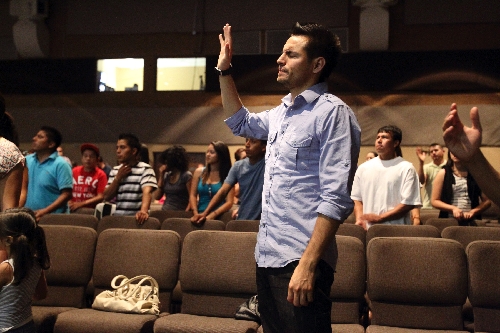Some Hispanics have second thoughts about Obama’s deportation relief
For almost 20 years, Agustin has lived in fear of being asked to show an ID he doesn't have.
He has lived with his parents in Las Vegas, undocumented and unknown to the government, ever since they moved from Mexico when he was about 7. Now 26, he's got a diploma from the University of Nevada, Las Vegas hanging on his wall.
So Agustin, who asked that his last name not be used, breathed a sigh of relief when President Barack Obama's administration announced earlier this month it would grant temporary relief from the threat of deportation to some children who were brought into the country illegally.
But then doubt set in: What might happen to his parents?
His concern was given voice Tuesday morning by the self-described bipartisan coalition Hispanics United, which held a news conference to draw attention to what it said were ambiguities in Obama's new immigration policy.
The policy is "really asking the DREAMers to put their parents at risk," said Carlo Maffatt, in reference to young illegal immigrants who have been pressing Congress to pass the DREAM Act, which would give them a path to citizenship. Maffatt joined a handful of other activists outside the office of U.S. Citizenship and Immigration Services in the southeast valley.
Maffatt, the former publisher and editor of the Spanish language publication El Tiempo, described the policy as a well-intentioned but poorly planned "half measure." El Tiempo is owned by Stephens Media, which also owns the Review-Journal.
Under the policy, a reprieve from deportation and the chance to apply for a two-year work permit will be available only to those age 30 or younger who came to this country before turning 16. They must have no record of felonies or major misdemeanors and must attend school, have graduated from high school, have obtained a GED certificate or have been honorably discharged from the U.S. military or Coast Guard.
There are between 800,000 and 1.4 million children of illegal immigrants nationwide, according to the Migration Policy Institute, including an estimated 30,000 in Nevada.
The Department of Homeland Security will spend the next 50 days or so finalizing the application and setting up the system.
There is nothing in the guidelines for the new program that says parents' information will be forwarded on to federal immigration agencies.
But the problem is that there is no immunity or protection spelled out for parents, said Niger Innis, spokesman for the Congress of Racial Equality, a civil rights group whose analysis of the policy was used by the Hispanics United group.
Innis, also a conservative commentator, said he was initially thrilled by the June 15 announcement of the policy. But then calls started pouring in from constituents concerned that, in having to prove eligibility, applicants could put their parents' secrecy at stake.
It has been a prime topic at the American Immigration Lawyers Association, Executive Director Crystal Williams said. Overall, the association is pleased by with the program but is concerned by the lack of assurance that parents will be protected and the question of what will happen to applicants who are denied.
Representatives of Obama's campaign and the White House deferred comment on the program to the Department of Homeland Security, which did not return several phone calls.
Secretary of Homeland Security Janet Napolitano in an interview on CNN said that the system has been set up so that parents are not referred to immigration enforcement.
Innis said his organization has spoken about its fears with U.S. Citizenship and Immigration Services, and he hopes they will get ironed out by the time applications for the program are opened, probably sometime in August.
Agustin said he will review the program application to weigh the risk of exposing his parents before deciding to apply.
He wants to put his degree in criminal justice to use. Although he dreams of being a juvenile probation officer, his immigration status has kept him working primarily in construction with his father.
If he applies, he knows it wouldn't be a permanent fix. The program won't provide a path to citizenship, just a reprieve from deportation. And for most speakers at Tuesday's news conference, the need for comprehensive immigration reform was the larger issue.
"This two-year work permit is ridiculous. These kids need something permanent," said speaker Helena Garcia, chairwoman of ethics for the Hispanic advocacy group Latinos in Action.
"You need a whole cast on your arm, not a Band-Aid," she said.
Innis agreed, but said, "Sometimes, though, a Band-Aid is better than nothing at all."
Contact Kyle Potter at kpotter@reviewjournal.com or 702-383-0391.




























